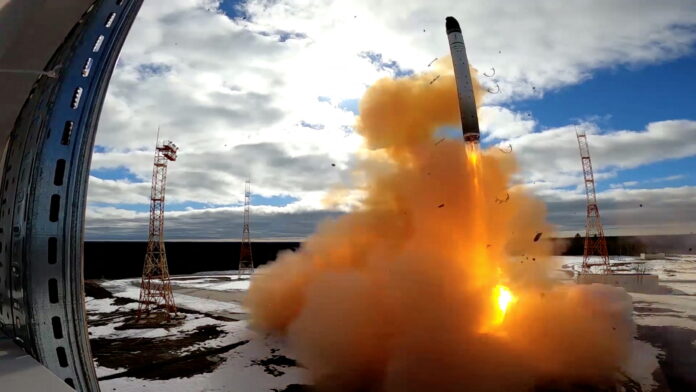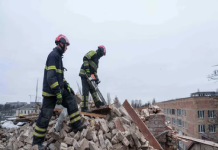
MOSCOW – Russian President Vladimir Putin revealed on Wednesday that the country’s state-of-the-art Sarmat intercontinental ballistic missiles, capable of carrying multiple nuclear warheads, would soon be ready for combat duty.
Addressing new graduates of military academies, Putin emphasized the significance of Russia’s “triad” of nuclear forces deployable from land, sea, or air.
“The most crucial objective here is the development of the nuclear triad, which serves as a fundamental guarantee for Russia’s military security and global stability,” he stated.
“Approximately half of the units and formations of the Strategic Missile Forces are already equipped with the latest Yars systems, and our troops are being furnished with modern missile systems featuring the Avangard hypersonic warhead.”
According to Putin, the initial Sarmat launchers will be placed on combat duty “in the near future.”
In the Kremlin’s St. George’s Hall, Defence Minister Sergei Shoigu informed the graduating class that the “collective West” is engaged in a “real war” against Russia, harkening back to the country’s remarkable military history. Since the outbreak of the Ukraine conflict, Putin has repeatedly said Russia is ready to use any means, including nuclear weapons, to defend its “territorial integrity.” Last year he declared that Russian-occupied and now-claimed Ukrainian territory was under Moscow’s nuclear umbrella.
Yet, just last week, Putin declared that a continued Ukrainian military counterattack was “no win” and that Russia had no reason to rely on nuclear weapons.
The deployment of the new Sarmat missile, designed to strike targets thousands of kilometers away in the United States or Europe, has been delayed from the original plan. Russia had already announced in April 2022 that the missile would be operational by the fall of the same year.
At the time, Russian Space Agency Director Dmitry Rogozin said the missile would be based in the Krasnoyarsk region of Siberia, about 1,860 miles (3,000 km) east of Moscow. Rogozin added that the replacement missile would be deployed in the same locations and silos as the Soviet-era Voevoda missile. He hailed the new “superweapon” as a historic milestone that will ensure the security of future generations of Russia for the next 30-40 years.





